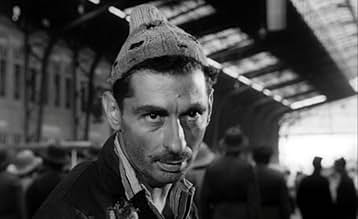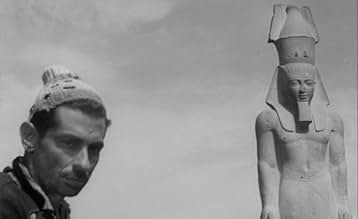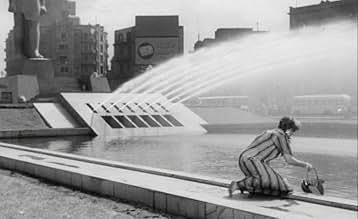IMDb RATING
7.5/10
5.7K
YOUR RATING
A newspaper salesman at the train station in Cairo develops an unhealthy obsession with a woman who sells refreshments.A newspaper salesman at the train station in Cairo develops an unhealthy obsession with a woman who sells refreshments.A newspaper salesman at the train station in Cairo develops an unhealthy obsession with a woman who sells refreshments.
- Director
- Writers
- Stars
- Awards
- 1 nomination total
Hind Rostom
- Hannumah
- (as Hind Rustum)
Abdel Ghani El Nagdi
- Rural traveler
- (as Abdel Ghani Nagdi)
- Director
- Writers
- All cast & crew
- Production, box office & more at IMDbPro
Featured reviews
Egypt's official entry for 'Best Foreign Language Film' at the 31st Academy awards, Cairo Station is director Youssef Chahine's paean to the city he was born in and which influenced much of his later work. Reviled in Egypt by critics and moviegoers alike on its release, the film is now considered among the finest works of its kind. With touches of Hitchcock and Powell, the film tells the story of a crippled news vendor (played by Chahine himself) who is besotted with a beautiful and capricious seller of cold drinks (Hind Rustom). This unhealthy obsession, bordering on the homicidal, leads to a tragic denouement.
This misplaced love story, if it can be called that, is played out against the backdrop of the main train station at Cairo. Indeed, more than the players, the station is the focal point of interest of the movie. A cesspool of unceasing human activity, with its fights, petty intrigues, welcomes and tear-stained farewells, the station is the throbbing heart of this vast metropolis which combines comedy and tragedy in equal measure in the stories its citizens live to narrate.
This is simply one fine movie because it follows a solid and involving story about simple characters, dealing with only seemingly small problems and frustrations.
This is actually a quite daring movie, from such a religious and strict country such as Egypt, especially for its time of course. Not that there is anything shocking in by any other standards but the main characters is a both mentally as physically handicapped one and the female lead is quite flirtatious and free-minded. Besides, the movie also casually has other themes such as female rights and abuse, not just toward women but also abuse from the bosses of the simple workers and denying them equal rights. But the movie is not preachy about any of these subjects at all and I like I said, it actually only handles it casually as the movie it's main story moves along. And the movie does move quite fast, which is not necessarily due to its pace but more because there is always something happening story-wise, with one of the many characters.
It's all being weaved in quite cleverly and effectively with its main story of the physically challenged peddler, who falls for the very attractive Hanuma, who is way more woman than he ever can handle. It's therefore also an already doomed love-story from the start and luckily the movie also doesn't have a fairy tale type of story.
It's a bit of an old fashioned done sort of movie, with also some unusual acting styles in it but this is what works quite refreshing at the same time. It's always interesting to compare movies from different continents, that got made during the same time period. Every country has its own strongly present culture present and also a different sort of film-making that goes along with it. This movie got made at the time period that is known as the golden age of Egyptian cinema. Many people don't seem to know this but during the '40's and '50's lots of worldwide critically acclaimed movies got made in Egypt, of which this movie is also one.
A great vivid movie, that follows a great story and has some solid characters in it.
8/10
http://bobafett1138.blogspot.com/
This is actually a quite daring movie, from such a religious and strict country such as Egypt, especially for its time of course. Not that there is anything shocking in by any other standards but the main characters is a both mentally as physically handicapped one and the female lead is quite flirtatious and free-minded. Besides, the movie also casually has other themes such as female rights and abuse, not just toward women but also abuse from the bosses of the simple workers and denying them equal rights. But the movie is not preachy about any of these subjects at all and I like I said, it actually only handles it casually as the movie it's main story moves along. And the movie does move quite fast, which is not necessarily due to its pace but more because there is always something happening story-wise, with one of the many characters.
It's all being weaved in quite cleverly and effectively with its main story of the physically challenged peddler, who falls for the very attractive Hanuma, who is way more woman than he ever can handle. It's therefore also an already doomed love-story from the start and luckily the movie also doesn't have a fairy tale type of story.
It's a bit of an old fashioned done sort of movie, with also some unusual acting styles in it but this is what works quite refreshing at the same time. It's always interesting to compare movies from different continents, that got made during the same time period. Every country has its own strongly present culture present and also a different sort of film-making that goes along with it. This movie got made at the time period that is known as the golden age of Egyptian cinema. Many people don't seem to know this but during the '40's and '50's lots of worldwide critically acclaimed movies got made in Egypt, of which this movie is also one.
A great vivid movie, that follows a great story and has some solid characters in it.
8/10
http://bobafett1138.blogspot.com/
"Cairo Station" is a very sad film...there's no getting around that. The story is tragic and when the film ends, you'll likely feel a bit drained...so don't day I didn't warn you. But I am not saying to avoid this Egyptian flick...it's well worth seeing.
The story begins with Madbouli introducing the film and explaining how me met and befriended Qinawi*. Qinawi was a poor guy with a limp without a friend in the world...so he adopted him and helped set him up at the train station selling newspapers. What follows for much of the film is showing the plight of all the many workers at the station-- the porters, women who work there illegally selling drinks and the rest. They get paid next to nothing and life is very, very hard.
About midway through the story, Qinawi approaches Hanouma and proposes to her. But he's poor, limps and seems a bit slow intellectually...and Hanouma is an obnoxious pig. So she laughs at him and belittles him for proposing to her! Qinawi is crushed...and soon has murder on his mind. Here is where it gets interesting because although everyone watching the picture knows murder is wrong, within many or perhaps most watching the film, there is a part of them that wants to see the coarse and horrid Hanouma die! This reminds me of the great 1944 film, "The Suspect"...where the audience naturally cheers for the leading man to kill and hopes he gets away with it!! I don't want to say more...other than the plan does NOT go as Qinawi hoped...and ends on a very sad note.
The film has a good story but there are other interesting things going for it. The camera-work is pretty amazing...especially coming from a nation not known for filmmaking. Many of the scenes have an almost film noir style to them with the lighting and camera angles. And, the film is rather daring--especially choosing to make the movie about folks near the bottom of society. Worth seeing.
*Like many films not in English and from countries with non-Western alphabets, there is no one way to spell the characters' names. The subtitles call him Qinawi and IMDb Kinawi...both are correct.
The story begins with Madbouli introducing the film and explaining how me met and befriended Qinawi*. Qinawi was a poor guy with a limp without a friend in the world...so he adopted him and helped set him up at the train station selling newspapers. What follows for much of the film is showing the plight of all the many workers at the station-- the porters, women who work there illegally selling drinks and the rest. They get paid next to nothing and life is very, very hard.
About midway through the story, Qinawi approaches Hanouma and proposes to her. But he's poor, limps and seems a bit slow intellectually...and Hanouma is an obnoxious pig. So she laughs at him and belittles him for proposing to her! Qinawi is crushed...and soon has murder on his mind. Here is where it gets interesting because although everyone watching the picture knows murder is wrong, within many or perhaps most watching the film, there is a part of them that wants to see the coarse and horrid Hanouma die! This reminds me of the great 1944 film, "The Suspect"...where the audience naturally cheers for the leading man to kill and hopes he gets away with it!! I don't want to say more...other than the plan does NOT go as Qinawi hoped...and ends on a very sad note.
The film has a good story but there are other interesting things going for it. The camera-work is pretty amazing...especially coming from a nation not known for filmmaking. Many of the scenes have an almost film noir style to them with the lighting and camera angles. And, the film is rather daring--especially choosing to make the movie about folks near the bottom of society. Worth seeing.
*Like many films not in English and from countries with non-Western alphabets, there is no one way to spell the characters' names. The subtitles call him Qinawi and IMDb Kinawi...both are correct.
At the crossroads of more than one thing, making it a fascinating film to come out of Egypt in 1958, and certainly shocking to its audiences. Chahine blends neorealism with a little Hitchcock in this story, and adds progressive elements that contrast with traditional Egyptian culture. Examples of these are the attempts of one man (Farid Shawqi) to unionize workers at a train station, the sexually free leading lady (Hind Rostom), scandalous at the time, and even in the cold drinks her character sells, which include western sodas like Pepsi.
The story centers on a lame newspaper seller (Chahine himself!) who obsesses over women in general, cutting out pinups to hang all over his shack, and Rostom's character in particular, despite the fact that she's already engaged and doesn't think much of him. The setup is brilliant and this one really had me hooked, though I thought it squandered some of its potential by not developing its story lines more completely, and narrowing in on the obsession too early.
It's an entertaining film however, not the least of which is due to Hind Rostom, who explodes on the screen. Her sassy character is seen soaking wet, dancing suggestively, and laying in a pile of hay with the implication that she'll have sex there, and the best part is that she's shown in a sympathetic light. In an interesting parallel, we see a group of women who are part of the Organization of Women Against Marriage, with one holding a book titled 'Free.' A contrast is shown in a woman in the market who complains to her husband that the lame newspaper seller has been staring at her, which causes him not only to beat the guy but also her, because it's "her fault" she didn't wear her veil.
The filmmaking here is top notch, with countless images and angles capturing the hubbub of the train station, including one in which a child is saved from being hit, which looked rather scary. There were also a couple images relative to the newspaper seller that I thought revealed his warped personality. In one of these, he looks through glass while his marital prospects are being mocked, distorting his face, and in another, he stands up after being rejected by the woman for not having a penny to his name, and we see a beautiful ancient statue in the background, a masculine figure looking not only healthy and strong, but content. He is a tragic figure because he's been shown empathy by the newsstand owner at the beginning of the film and because he professes the virtues of simplicity and dedication to the woman he loves, things which in a Hollywood film would probably have won out in the end, but not here. I can't say I loved how it played out, but I respected it, and am glad I finally saw this film.
The story centers on a lame newspaper seller (Chahine himself!) who obsesses over women in general, cutting out pinups to hang all over his shack, and Rostom's character in particular, despite the fact that she's already engaged and doesn't think much of him. The setup is brilliant and this one really had me hooked, though I thought it squandered some of its potential by not developing its story lines more completely, and narrowing in on the obsession too early.
It's an entertaining film however, not the least of which is due to Hind Rostom, who explodes on the screen. Her sassy character is seen soaking wet, dancing suggestively, and laying in a pile of hay with the implication that she'll have sex there, and the best part is that she's shown in a sympathetic light. In an interesting parallel, we see a group of women who are part of the Organization of Women Against Marriage, with one holding a book titled 'Free.' A contrast is shown in a woman in the market who complains to her husband that the lame newspaper seller has been staring at her, which causes him not only to beat the guy but also her, because it's "her fault" she didn't wear her veil.
The filmmaking here is top notch, with countless images and angles capturing the hubbub of the train station, including one in which a child is saved from being hit, which looked rather scary. There were also a couple images relative to the newspaper seller that I thought revealed his warped personality. In one of these, he looks through glass while his marital prospects are being mocked, distorting his face, and in another, he stands up after being rejected by the woman for not having a penny to his name, and we see a beautiful ancient statue in the background, a masculine figure looking not only healthy and strong, but content. He is a tragic figure because he's been shown empathy by the newsstand owner at the beginning of the film and because he professes the virtues of simplicity and dedication to the woman he loves, things which in a Hollywood film would probably have won out in the end, but not here. I can't say I loved how it played out, but I respected it, and am glad I finally saw this film.
I don't really agree with certain circles who claim Cairo Station "one of the greatest films ever made" but it's a neat little film. It has that very basic, almost primitive, shooting style and editing which in some ways reminds of me Greek romance melodramas from the same time yet the perverse content sets it worlds apart from that kind of populist cinema which I suspect was as popular with lower/middle-class audiences in Egypt as it was in Greece. I liked that Chahine makes the titular railway station a stage for contrast between the old and the new. Between fashionable swinging Egyptians and the traditional Muslim conservatives. Between a lady president dressed in a modern pantsuit and destitute girls selling soda to the passengers. Between the old feudal faction of porters and the new one trying to assert its working rights by forming a union. This sociopolitical contrast touching on contemporary changes in Egyptian society (which, other than what the movie presents, I know nothing about but seem to be almost identical with the anxieties that surfaced in Greek screwball comedies of the same time) reflected in the movie itself, out of a typical melodrama of thwarted love Chahine dragging a dark noirish thriller with psychosexual undertones and an almost slasher-like turn in the third act replete with knife-wielding crazies chasing beautiful women that predates Psycho by a good two years. In borrowing the generic aspects of a programme picture for his character-driven piece and portraying his mentally imbalanced protagonist with sympathy and humanity, Chahine made a movie more wholesome than its 73 minute duration would suggest.
Did you know
- TriviaOfficial submission of Egypt for the 'Best Foreign Language Film' category of the 31st Academy Awards in 1959.
- ConnectionsFeatured in Caméra arabe (1987)
- How long is Cairo Station?Powered by Alexa
Details
- Release date
- Country of origin
- Language
- Also known as
- Cairo Station
- Filming locations
- See more company credits at IMDbPro
- Runtime1 hour 17 minutes
- Color
- Sound mix
- Aspect ratio
- 1.37 : 1
Contribute to this page
Suggest an edit or add missing content











